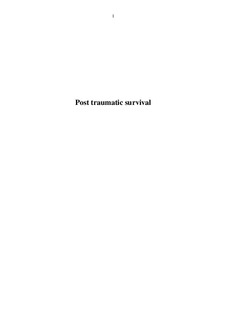| dc.contributor.author | Øverland, Gwynyth | |
| dc.date.accessioned | 2013-03-14T13:50:19Z | |
| dc.date.available | 2013-03-14T13:50:19Z | |
| dc.date.issued | 2012 | |
| dc.identifier.isbn | 978-82-7117-710-2 | |
| dc.identifier.issn | 1504-9272 | |
| dc.identifier.uri | http://hdl.handle.net/11250/139732 | |
| dc.description | Doctoral Dissertation, University of Agder, Faculty of Humanities and Education - 2012 | no_NO |
| dc.description.abstract | Among refugee survivors of war, torture and human rights abuses, the waiting lists for rehabilitation increase daily. How can war-refugees best be assisted? The experience of earlier refugee groups has remained a largely untapped resource in this work. This study sets out to discover what successful survivors of the Khmer Rouge have found instrumental for their survival and mental health. The aim is to make a contribution to the understanding of resilience, here understood as the ability to recover from misfortune or change, and to the psychosocial rehabilitation of survivors of war crimes and other traumatic events.
The research project follows a comparative case-study design based on data from three samples of resilient Cambodians, in all 30 persons selected on the basis of a seven criteria scale. A multi-strategy approach generates theory from participants’ biographical narratives and explanations of their survival, using NVivo software for microanalysis, an exegesis or explication of frequently-used Khmer words, and an abductive approach involving participant validation of collective narratives reinterpreted from the data. Finally, a group of international experts in transcultural mental health care are interviewed to triangulate the findings and prepare presentations for other health workers.
The findings suggest that the resilience of the Cambodians interviewed builds on self-reliance, a strong work ethic and social integration, all founded in a pervasive worldview. For these successful survivors, religion and culture have provided a secure ‘knowledge’, both of how to act and of how to understand the traumatic events of the Khmer Rouge regime. These cognitive and normative devices used by individuals in their subjective ordering of experience suggest the possibility that parallel resources may be available for other post-trauma survivors as well. Psychosocial guidelines for accessing patients’ cultural backgrounds are available, but health workers often fail to access the cultural explanatory models used by survivors in building personal and group resilience. Proposals from the project are incorporated in a cultural resilience interview scheme for the use of health and social workers wishing to do resilience work with war survivors | no_NO |
| dc.description.sponsorship | Supported by Helse Sør-Øst, Sørlandet Sykehus HF and RVTS Sør | no_NO |
| dc.language.iso | eng | no_NO |
| dc.publisher | Universitet i Agder / University of Agder | no_NO |
| dc.relation.ispartofseries | Doctoral dissertations at the University of Agder;47 | |
| dc.title | Post traumatic survival : a study of Cambodian resilience | no_NO |
| dc.type | Doctoral thesis | no_NO |
| dc.type | Peer reviewed | no_NO |
| dc.subject.nsi | VDP::Humanities: 000::Philosophical disciplines: 160::Ethics: 164 | no_NO |
| dc.subject.nsi | VDP::Medical disciplines: 700::Clinical medical disciplines: 750::Psychiatry, child psychiatry: 757 | no_NO |
| dc.source.pagenumber | 302 p. | no_NO |
